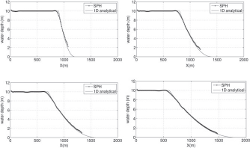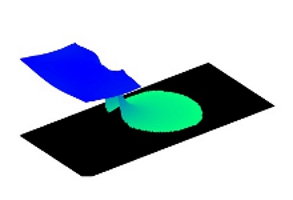







SWE-SPHysics
From SPHYSICS
| The two-dimensional shallow-water equations (SWEs) are widely used to approximate flows for a wide range of rapidly (and slowly) varying free-surface flows, such as dam breaks, river flooding, and tidal flows including storm surge and wave overtopping causing inundation in estuaries and coastal regions. Grid-based solvers are now widely available. Although accurate and robust wetting and drying routines have been developed, grid-based solvers are limited in simulating multi-phase effects, most importantly flows with rapid distortion in flood modelling. |
| Here, the SPHysics numerical scheme, originally developed to solve Navier-Stokes Equations has been extended to shallow water equations.
|
| Developers: Dr Renato Vacondio, Dr Benedict Rogers, Prof. Peter Stansby, Prof. Paolo Mignosa
|
|
Key code features:
|
1-D Test Cases
|
2-D Test Cases
|
Released March 2013
SWE-SPHYSICS_1D_v1.0 March 2013
SWE-SPHYSICS_2D_v1.0 March 2013
Documentation of the shallow water equation (SWE) code:
SWE-SPHysics v1.0.00.pdf March 2013
How to reference: How to reference SWE-SPHysics.

